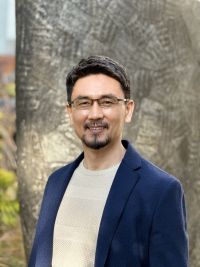Quantum Machine Learning (양자 기계 학습): Difference between revisions
Mahnsoo.choi (talk | contribs) (→연사 소개) |
Mahnsoo.choi (talk | contribs) (→연사 소개) |
||
| Line 7: | Line 7: | ||
[[File:Mahnsoo_Choi-1.jpg|right|200px|link=]] | [[File:Mahnsoo_Choi-1.jpg|right|200px|link=]] | ||
[[Choi, Mahn-Soo|최만수]]는 고려대학교 물리학과 교수이며 고려대학교(주관) 양자대학원의 원장이다. 그는 포스텍에서 공부하고 1998년에 이론 물리학으로 박사 학위를 취득했다. 그 후 스위스 바젤 대학에서 박사 후 연구원으로 근무한 뒤 한국고등과학원에서 연구 펠로우를 거쳐, 2002년에 고려대학교 물리학과에 조교수로 부임하여 2010년 정교수가 되었다. 그는 응집물질물리이론으로 연구 경력을 시작해 양자 계산과 양자 정보 이론으로 연구 분야를 확대했다. 그는 양자점의 스핀 큐비트, 초전도 큐비트, 초전도 회로 QED 및 관련 양자 하이브리드 시스템, 그리고 중시계 양자수송현상에 대해 연구해 왔다. | |||
[[Choi, Mahn-Soo|Mahn-Soo Choi]] is a Professor of Physics at Korea University and the director of the [https://QuantumWorkforce.kr Center for Quantum Sapient Workforce]. He studied at POSTECH and acquired his PhD in theoretical physics in 1998. After a postdoctoral fellowship at the University of Basel in Switzerland and a research fellowship at Korea Institute for Advanced Study, he joined the Faculty of Physics at Korea University in 2002. He started his research career in condensed matter theory, and extended his interest to quantum computation and quantum information theory. He has been working on spin qubits in quantum dots, superconducting qubits, the superconducting circuit QED and related quantum hybrid systems, and mesoscopic transport. | [[Choi, Mahn-Soo|Mahn-Soo Choi]] is a Professor of Physics at Korea University and the director of the [https://QuantumWorkforce.kr Center for Quantum Sapient Workforce]. He studied at POSTECH and acquired his PhD in theoretical physics in 1998. After a postdoctoral fellowship at the University of Basel in Switzerland and a research fellowship at Korea Institute for Advanced Study, he joined the Faculty of Physics at Korea University in 2002. He started his research career in condensed matter theory, and extended his interest to quantum computation and quantum information theory. He has been working on spin qubits in quantum dots, superconducting qubits, the superconducting circuit QED and related quantum hybrid systems, and mesoscopic transport. | ||
[[Category:WLC2023]] | [[Category:WLC2023]] | ||
Revision as of 09:36, 6 October 2023
최만수 (고려대학교 물리학과)
양자 기계 학습은 양자 알고리즘을 기계 학습 프로그램 내에 통합하는 것을 말한다. 가장 일반적인 형태는 양자 향상된 기계 학습으로, 고전 데이터 분석을 위한 기계 학습 알고리즘을 양자 컴퓨터에서 실행하게 된다. 기계 학습 알고리즘은 흔히 방대한 양의 데이터를 계산하는 데 사용되지만, 양자 기계 학습은 계산 속도와 데이터 저장 용량을 개선하기 위해 큐비트 및 양자 연산 또는 특수한 양자 시스템을 활용한다. 이는 고전 및 양자 처리를 모두 포함하는 하이브리드 방법을 포함한다. 이 발표에서는 울프램 언어를 이용하여 손쉽게 양자 기계 학습을 시뮬레이션하면서, 실제 양자 컴퓨터에서 이루어지는 양자 기계 학습의 원리를 공부하는 것을 소개한다. 특히, 양자 시뮬레이션 프레임워크인 Q3를 이용하여 여러 가지 기본적인 양자 기계 학습 예를 소개할 것이다.
연사 소개

최만수는 고려대학교 물리학과 교수이며 고려대학교(주관) 양자대학원의 원장이다. 그는 포스텍에서 공부하고 1998년에 이론 물리학으로 박사 학위를 취득했다. 그 후 스위스 바젤 대학에서 박사 후 연구원으로 근무한 뒤 한국고등과학원에서 연구 펠로우를 거쳐, 2002년에 고려대학교 물리학과에 조교수로 부임하여 2010년 정교수가 되었다. 그는 응집물질물리이론으로 연구 경력을 시작해 양자 계산과 양자 정보 이론으로 연구 분야를 확대했다. 그는 양자점의 스핀 큐비트, 초전도 큐비트, 초전도 회로 QED 및 관련 양자 하이브리드 시스템, 그리고 중시계 양자수송현상에 대해 연구해 왔다.
Mahn-Soo Choi is a Professor of Physics at Korea University and the director of the Center for Quantum Sapient Workforce. He studied at POSTECH and acquired his PhD in theoretical physics in 1998. After a postdoctoral fellowship at the University of Basel in Switzerland and a research fellowship at Korea Institute for Advanced Study, he joined the Faculty of Physics at Korea University in 2002. He started his research career in condensed matter theory, and extended his interest to quantum computation and quantum information theory. He has been working on spin qubits in quantum dots, superconducting qubits, the superconducting circuit QED and related quantum hybrid systems, and mesoscopic transport.